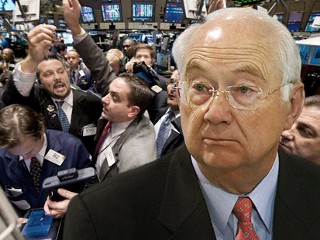Who's Whining Now? Gramm Slammed By Economists
'Nation of Whiners' Comments Criticized by Finance Experts in Light of Current Crisis
By MARCUS BARAM
Sept. 19, 2008—
abcnews.go.com
Talk about words coming back to haunt you.
Phil Gramm, John McCain's former economic adviser, left the campaign in July when he tried to counter criticism of the Republican candidate's economic policies by asserting that the country "had become a nation of whiners" in a "mental recession."
Even McCain came forward to say that he disagreed with Gramm's remarks, adding that someone who'd lost their job "isn't suffering from a mental recession."

And Barack Obama is using Gramm's comments and his support of deregulation, which prompted some of the risky lending that caused the current financial crisis, in a new TV ad that questions McCain's ability to handle the economy.
"They think the economy's fundamentally strong," intones a voice-over in the ad. "We know they're fundamentally wrong."
Though Gramm, a former Texas senator, is no longer a member of McCain's close-knit team, he still seems to be assisting the campaign.
Last week, former Republican presidential candidate Ron Paul says Gramm, who is a vice chairman of the investment banking division at UBS, called to urge him to endorse McCain. Gramm also appeared in the audience at an Aspen Institute Forum featuring McCain last month.
Gramm's comments seem all the more stark with the financial upheaval of the past few weeks, including the government takeover of mortgage giants Fannie Mae and Freddie Mac, as well as the de facto takeover of largest insurer AIG.
"This is a mentality that doesn't understand the nature of systemic risks in financial systems," says Joseph Stiglitz, Nobel Prize-winning economist and former chairman of President Clinton's Council of Economic Advisers. "It's social Darwinism."
Economic experts say that Gramm and others are to blame for the current crisis that is shaking Wall Street.
Gramm's successful effort to pass banking reform laws in 1999, which reduced decades-old regulations separating banking, insurance and brokerage activities, helped to create the current economic crisis.
"As a result, the culture of investment banks was conveyed to commercial banks and everyone got involved in the high-risk gambling mentality. That mentality was core to the problem that we're facing now," Stiglitz says.
Lakshman Achuthan, managing director of the Economic Cycle Research Institute, also asserted that Gramm was mistaken, criticizing him and economic policymakers for not taking the risk of recession seriously enough.
"There is a recession -- that is clear and it doesn't make sense to blame middle-class folks," says Achuthan. "Policy holders should be held fully accountable for letting Wall Street run amok."
Achuthan agrees that Gramm's banking reform laws helped lead to the subprime mortgage crisis as commercial banks started taking enormous risks.
"We were setting up this bonfire years ago -- the deregulation, the inordinate amount of liquidity given to the system all set the stage for the bubble and the bust," he explains.
Gramm was not available for comment and a UBS spokesman declined comment on his behalf. "He's in back-to-back meetings all day and not very interested in doing interviews this week," said UBS spokesman Doug Morris.
Asked whether Gramm has any official or unofficial role in the campaign, McCain spokesman Brian Rogers said, "He is a supporter. He has no advisory role to the campaign."
Some economists noted that Gramm's comments, while insensitive to the struggles of working-class Americans, were made earlier this summer, after the collapse of Bear Stearns but before this weekend's crisis.
"Those comments were for another time, another place and just don't apply to the current situation," explains Allen Sinai, chief economist at consultancy Decision Economics, who predicted that the country faces its longest recession since World War II.
"I'm not whiner, but the financial system is in a crisis. And it's not just a financial system problem but a Main Street problem that affects many Americans."
Political pundits says that Gramm's comments hurt the McCain campaign and illustrated how the candidate seems to be more vulnerable than Obama on economic issues.
"There might be a grain of truth in what he says -- in terms of big macro-economic trends like unemployment and inflation, the economy is not so bad -- but from the perspective of those on the lower end, it's a very different-looking story and it doesn't play well politically," says Nolan McCarty, congressional and presidential scholar at Princeton University.
"It made McCain look insensitive and out of touch," he explains, comparing it to George Bush Sr.'s difficulties running against Bill Clinton in the 1992 campaign.
"Though he's not George Bush, [the crisis] presents more of a vulnerability to McCain, the fact that his power has been in power for eight years and it hurts him because Republicans tend to be associated as the party of finance."
Copyright © 2008 ABC News Internet Ventures |




